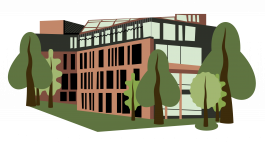3 El Presente Continuo / The Present Continuous (Estoy amando)
El Presente Continuo / The Present Continuous (Estoy amando)
The Present Continuous is used to talk about things that are happening right now. An example in English would be “I am walking to the beach (right now)”. The Present Continuous is made up of estar and the gerund.
The gerund is formed by taking away the ar / er / ir from the verb and adding a new ending. The ending for ar verbs is ando, and the ending for both er and ir verbs is iendo.
|
Personal Pronoun |
estar |
habl- |
com- |
viv- |
|
Yo
|
estoy
|
hablando
|
comiendo
|
viviendo
|
|
Tú
|
estás
|
|||
|
Él/Ella/Usted
|
está
|
|||
|
Nosotros/Nosotras
|
estamos
|
|||
|
Vosotros/Vosotras
|
estáis
|
|||
|
Ellos/Ellas/Ustedes
|
están
|
However, not all gerunds follow this pattern. Some have spelling changes which have to be learned separately. The following is a list of several important irregular gerunds.
|
caer
|
cayendo
|
falling
|
dormir
|
durmiendo
|
sleeping
|
|
traer
|
trayendo
|
bringing
|
reír
|
riendo
|
laughing
|
|
leer
|
leyendo
|
reading
|
pedir
|
pidiendo
|
asking for
|
|
creer
|
creyendo
|
believing
|
sentir
|
sintiendo
|
feeling
|
|
oír
|
oyendo
|
hearing
|
venir
|
viniendo
|
coming
|
|
construir
|
construyendo
|
building
|
decir
|
diciendo
|
saying
|
Reflexive Verbs and the Present Continuous
There are two ways to use the Present Continuous with reflexive verbs. The reflexive part (se) can either be attached to the end of the gerund, or stand alone as a separate word before estar. We will look at examples of both ways below, using the reflexive verbs lavarse (to wash oneself) and aburrirse (to get bored).
|
Personal Pronoun
|
estar
|
lavarse
|
English
|
|
Yo
|
estoy
|
lavándome
|
I am washing (myself)
|
|
Tú
|
estás
|
lavándote
|
You are washing (yourself)
|
|
Él/Ella/Usted
|
está
|
lavándose
|
He is washing (himself)
She is washing (herself) You are washing (yourself) |
|
Nosotros/Nosotras
|
estamos
|
lavándonos
|
We are washing (ourselves)
|
|
Vosotros/Vosotras
|
estáis
|
lavándoos
|
You are washing (yourselves)
|
|
Ellos/Ellas/Ustedes
|
están
|
lavándose
|
They are washing (themselves)
You are washing (yourselves) |
|
Personal Pronoun
|
estar
|
aburrir
|
English
|
|
Yo
|
estoy
|
aburriéndome
|
I am getting bored
|
|
Tú
|
estás
|
aburriéndote
|
You are getting bored
|
|
Él/Ella/Usted
|
está
|
aburriéndose
|
He is getting bored
She is getting bored You are getting bored |
|
Nosotros/Nosotras
|
estamos
|
aburriéndonos
|
We are getting bored
|
|
Vosotros/Vosotras
|
estáis
|
aburriéndoos
|
You are getting bored
|
|
Ellos/Ellas/Ustedes
|
están
|
aburriéndose
|
They are getting bored
You are getting bored |
When reflexive verbs in the Present Continuous have the reflexive part attached to the end of the gerund, as above, the a or the e in the gerund ending takes an accent.
As mentioned above, you can also put the reflexive part before estar as a separate word.
|
Personal Pronoun
|
se
|
estar
|
lavar
|
English
|
|
Yo
|
me
|
estoy
|
lavando
|
I am washing (myself)
|
|
Tú
|
te
|
estás
|
lavando
|
You are washing (yourself)
|
|
Él/Ella/Usted
|
se
|
está
|
lavando
|
He is washing (himself)
She is washing (herself) You are washing (yourself) |
|
Nosotros/Nosotras
|
nos
|
estamos
|
lavando
|
We are washing (ourselves)
|
|
Vosotros/Vosotras
|
os
|
estáis
|
lavando
|
You are washing (yourselves)
|
|
Ellos/Ellas/Ustedes
|
se
|
están
|
lavando
|
They are washing (themselves)
You are washing (yourselves) |
|
Personal Pronoun
|
se
|
estar
|
aburrir |
English
|
|
Yo
|
me
|
estoy
|
aburriendo
|
I am getting bored
|
|
Tú
|
te
|
estás
|
aburriendo
|
You are getting bored
|
|
Él/Ella/Usted
|
se
|
está
|
aburriendo
|
He is getting bored
She is getting bored You are getting bored |
|
Nosotros/Nosotras
|
nos
|
estamos
|
aburriendo
|
We are getting bored
|
|
Vosotros/Vosotras
|
os
|
estáis
|
aburriendo
|
You are getting bored
|
|
Ellos/Ellas/Ustedes
|
se
|
están
|
aburriendo
|
They are getting bored
You are getting bored |

